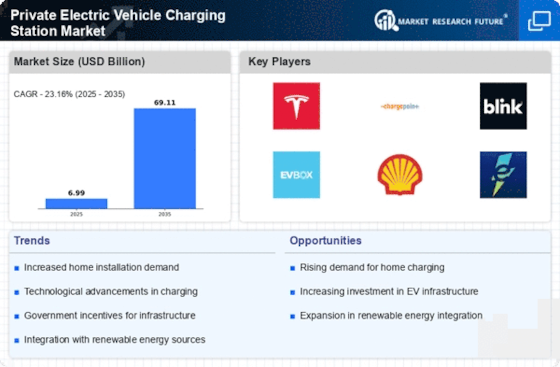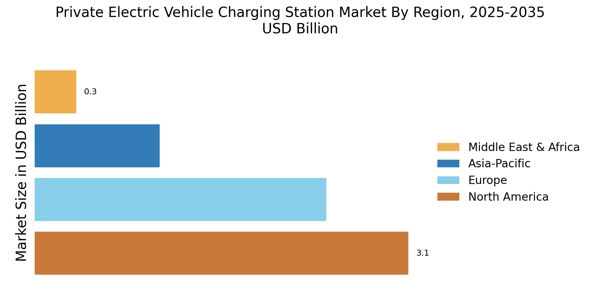Growing Environmental Awareness
Growing environmental awareness among consumers is a significant driver for the Private Electric Vehicle Charging Station Market. As individuals become more conscious of their carbon footprint and the impact of fossil fuels on climate change, there is a noticeable shift towards sustainable transportation options. This heightened awareness is encouraging more consumers to consider electric vehicles as a viable alternative to traditional gasoline-powered cars. Consequently, the demand for private charging stations is expected to rise, as consumers seek to support their environmentally friendly choices with convenient charging solutions. The Private Electric Vehicle Charging Station Market stands to gain from this trend, as the push for greener transportation options continues to gain momentum.
Government Incentives and Subsidies
Government incentives and subsidies play a crucial role in promoting the Private Electric Vehicle Charging Station Market. Various governments have introduced financial incentives to encourage the installation of private charging stations, which can significantly reduce the initial investment costs for consumers. For instance, tax credits, rebates, and grants are often available for homeowners and businesses that install charging infrastructure. This financial support not only makes the installation of charging stations more appealing but also accelerates the adoption of electric vehicles. As a result, the Private Electric Vehicle Charging Station Market is likely to experience robust growth, driven by favorable government policies aimed at reducing carbon emissions and promoting sustainable transportation solutions.
Increased Electric Vehicle Adoption
The rise in electric vehicle adoption is a primary driver for the Private Electric Vehicle Charging Station Market. As consumers increasingly opt for electric vehicles, the demand for convenient charging solutions grows. Recent data indicates that electric vehicle sales have surged, with projections suggesting that by 2025, electric vehicles could account for a substantial percentage of new car sales. This trend necessitates the establishment of private charging stations, as consumers seek to charge their vehicles at home or at work. The convenience and accessibility of private charging stations are likely to enhance the overall ownership experience, thereby further stimulating market growth. As more individuals transition to electric vehicles, the Private Electric Vehicle Charging Station Market is poised to expand significantly, reflecting the changing landscape of personal transportation.
Urbanization and Infrastructure Development
Urbanization and infrastructure development are pivotal factors influencing the Private Electric Vehicle Charging Station Market. As urban areas expand and populations grow, the demand for efficient transportation solutions increases. This urban growth often leads to the development of new residential and commercial properties, which frequently include provisions for private electric vehicle charging stations. Furthermore, as cities implement policies to promote electric vehicle usage, the need for accessible charging infrastructure becomes more pronounced. The Private Electric Vehicle Charging Station Market is likely to thrive in urban settings, where the integration of charging stations into new developments aligns with the broader goals of sustainable urban planning and reduced emissions.
Technological Innovations in Charging Solutions
Technological innovations in charging solutions are transforming the Private Electric Vehicle Charging Station Market. Advances in charging technology, such as faster charging speeds and smart charging capabilities, are enhancing the user experience. For example, the development of ultra-fast chargers can significantly reduce charging times, making private charging stations more attractive to consumers. Additionally, the integration of smart technology allows users to monitor and control their charging sessions remotely, providing added convenience. As these innovations continue to evolve, they are expected to drive increased demand for private charging stations, as consumers seek efficient and user-friendly solutions for their electric vehicles. The Private Electric Vehicle Charging Station Market is thus likely to benefit from ongoing technological advancements.

















